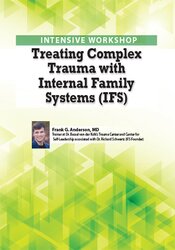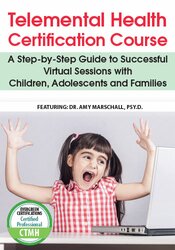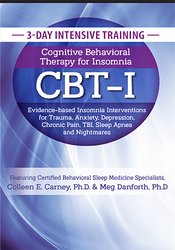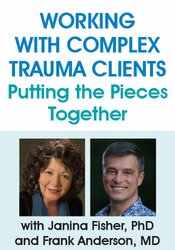Buy 2-Day Intensive Workshop-Treating Complex Trauma with Internal Family Systems (IFS) – Frank Anderson Course at GBesy. We actively participate in Groupbuys and are committed to sharing knowledge with a wider audience. Rest assured, the quality of our courses matches that of the original sale page. If you prefer, you can also buy directly from the sale page at the full price (the SALEPAGE link is directly provided in the post).
2-Day Intensive Workshop-Treating Complex Trauma with Internal Family Systems (IFS) by Frank Anderson,
Salepage link: At HERE. Archive:
- Faculty:
- Frank Anderson
- Duration:
- 12 Hours 31 Minutes
- Format:
- Audio and Video
- Copyright:
- Sep 10, 2020
Description
Most modes of psychotherapy believe to have “parts” is pathological. NOT in Internal Family Systems (IFS). In IFS, the idea of multiplicity of the mind is normal. Every part has a good intention, and every part has value. Even for trauma survivors.
In the treatment of trauma, IFS is different from traditional phase-oriented treatments. Instead of starting with building resources in clients before processing traumatic memories, it welcomes extreme symptoms from the onset, learns about their positive protective intentions and gets their permission to access the traumatic wounds. IFS also differs from traditional attachment focused therapies, both value the therapeutic relationship; however, IFS additionally supports the relationship between the client’s “Self” and their part as the primary healing agent.
Hailed by Dr. van der Kolk, the world’s leading expert in trauma, IFS is the treatment method that all clinicians should know. Nearly all clients with a trauma history have innate abilities that help them improve their mental health if they listen to their parts. IFS does just that. IFS is an evidence-based approach for clinicians working with traumatized clients. Once you see it in action, you’ll want to incorporate it into your practice.
Watch IFS and trauma expert Frank Anderson, MD, colleague of Dr. Bessel van der Kolk and Dr. Richard Schwartz, in this transformational certificate training.
Clients will leave your office with skills to use outside the therapy room to help them master their emotions. This experiential training will show video demonstrations and include exercises and meditation techniques to use with your clients.
Handouts
| Manual – 2-Day Treating Complex Trauma with IFS (2.57 MB) | 70 Pages | Available after Purchase |
Outline
Treating the Various Types of Trauma
- Acute trauma
- PTSD
- Complex or relational trauma
- Developmental and attachment traumas
- Extreme or dissociative trauma
Internal Family Systems (IFS): Healing of Emotional Wounds
- The origins, goals & assumptions
- A non-pathologizing, accelerated approach, rooted in neuroscience
- Different from phase-oriented treatment
- The importance of our protective responses
- Deal with emotional overwhelm head-on
- Multiplicity of the mind – we all have parts
- Healing at the cellular level
- Study limitations: small sample size, no control group
- Clinical considerations for clients experiencing abuse
Manage Common Co-Morbidities
- Depression, panic attacks, substance abuse, eating disorders, ADD and OCD
- A non-pathological approach
- Comorbidities as protective responses to trauma
- Symptoms as “parts of the self”
Differentiate Therapeutic Issues from Biological Conditions
- Intersection of biology and situation (“Real Mind-Body Medicine”)
- Therapist’s role in biology – When to refer and when to work it through
- Psychotherapy of psychopharmacology
The IFS Technique
Step 1: Identify the Target Symptom
- Identify the “target symptom”
- Apply meditation practices
- Separate the person (self) from the symptom
- Learn about its intention
Step 2: Gain Access to Internal Strengths & Resource for Healing
- Move from defensiveness to curiosity
- The “Self” of the therapist-countertransference redefined
- Access compassion to open the pathways toward healing
- Role of empathy in healing – the benefits and the downsides
Step 3: Find the Fear and Function of the Symptom
- Focusing on its fear
- The real story behind the symptom
- Foster the internal relationship
Attachment Disorders and Relational Trauma
- IFS as internal attachment work
- Attachment styles as parts of self
- Attachment trauma – the role of the therapist
- Heal relational wounds of childhood
- Client’s “Self” as the corrective object
- Work with preverbal trauma
The Neurobiology of Trauma
- Neuroscience for therapists – what you need to know
- Fear circuitry and the development of PTSD
- Extreme reactions and Autonomic Nervous System
- Rage to suicide and dissociation to shame
Dealing with the Extreme Reactions of Trauma
- Talk directly to the symptom-direct access
- Introducing the part to the “Self”
- Deal with the overwhelm – no need for building resources
- Therapist parts – How to stay clear and calm while working with clients in extreme states
How Neuroscience Informs Therapeutic Decisions
- Top-down and bottom-up strategies rooted in neuroscience
- When it’s necessary to take over and “be the auxiliary brain” for your client
- Sensing vs. making sense of things
- At home strategies
Step 4: Healing of Traumatic Wounds:
- Three phases to healing:
- Witness the pain
- Remove the wounded part out of the past
- Let go of the feelings, thoughts and beliefs
- Science behind the healing – memory reconsolidation
Integrate IFS into Your Treatment Approach
- EMDR, DBT, Sensorimotor/SE and other methods
- Transformation vs adaptation or rehabilitation
- Going beyond the cognitive (experiential therapies)
- Integrate IFS with your current clinical approach
Live demonstrations
Meditations
Practice sessions
Faculty

Frank Anderson, MD Related seminars and products: 18
Frank Anderson, MD, completed his residency and was a clinical instructor in psychiatry at Harvard Medical School. He is both a psychiatrist and psychotherapist and specializes in the treatment of trauma and dissociation. He is passionate about teaching brain-based psychotherapy and integrating current neuroscience knowledge with the IFS model of therapy.
Dr. Anderson is a lead trainer at the IFS Institute with Richard Schwartz and maintains a long affiliation with, and trains for, Bessel van der Kolk’s Trauma Center. He serves as an advisor to the International Association of Trauma Professionals (IATP) and was the former chair and director of the Foundation for Self-Leadership.
Dr. Anderson has lectured extensively on the Neurobiology of PTSD and Dissociation and wrote the chapter “Who’s Taking What” Connecting Neuroscience, Psychopharmacology and Internal Family Systems for Trauma in Internal Family Systems Therapy – New Dimensions. He co-authored a chapter on “What IFS Brings to Trauma Treatment in Innovations and Elaborations in Internal Family Systems Therapy” and recently co-authored Internal Family Systems Skills Training Manual.
Dr. Anderson maintains a private practice in Concord, MA.
Speaker Disclosures:
Financial: Frank Anderson maintains a private practice. He receives a consulting fee from the Center for Self Leadership. Dr. Anderson receives a speaking honorarium from PESI, Inc.
Non-financial: Frank Anderson is the President of the Foundation for Self Leadership.
Buy the 2-Day Intensive Workshop-Treating Complex Trauma with Internal Family Systems (IFS) – Frank Anderson course at the best price at GBesy.. After your purchase, you will get access to the downloads page. You can download all the files associated in your order at here and we will also send a download notification email via your mail.
Unlock your full potential with 2-Day Intensive Workshop-Treating Complex Trauma with Internal Family Systems (IFS) – Frank Anderson courses. our courses are designed to help you excel.
Why wait? Take the first step towards greatness by purchasing 2-Day Intensive Workshop-Treating Complex Trauma with Internal Family Systems (IFS) – Frank Anderson courses today. We offer a seamless and secure purchasing experience, ensuring your peace of mind. With our trusted payment gateways, Stripe and PayPal, you can confidently complete your transaction knowing that your financial information is protected.
Stripe, known for its robust security measures, provides a safe and reliable payment process. With its encrypted technology, your sensitive data remains confidential throughout the transaction. Rest assured that your purchase is protected.
PayPal, a globally recognized payment platform, offers an additional layer of security. With its buyer protection program, you can feel confident in your purchase. PayPal ensures that your financial details are safeguarded, allowing you to focus on your learning journey.
Is it secure? to Use of?
- Your identity is completely confidential. We do not share your information with anyone. So it is absolutely safe to buy the 2-Day Intensive Workshop-Treating Complex Trauma with Internal Family Systems (IFS) – Frank Anderson course.
- 100% Safe Checkout Privateness coverage
- Communication and encryption of sensitive knowledge
- All card numbers are encrypted using AES at relaxation-256 and transmitting card numbers runs in a separate internet hosting atmosphere, and doesn’t share or save any data.
How can this course be delivered?
- After your successful payment this “2-Day Intensive Workshop-Treating Complex Trauma with Internal Family Systems (IFS) – Frank Anderson course”, Most of the products will come to you immediately. But for some products were posted for offer. Please wait for our response, it might take a few hours due to the time zone difference.
- If this happens, please wait. The technical department will process the link shortly after. You will receive notifications directly by e-mail. We appreciate your wait.
What Shipping Methods Are Available?
- You will receive a download link in the invoice or YOUR ACCOUNT.
- The course link always exists. use your account to login and download the 2-Day Intensive Workshop-Treating Complex Trauma with Internal Family Systems (IFS) – Frank Anderson course whenever you need.
- You only need to visit a single link, and you can get all the 2-Day Intensive Workshop-Treating Complex Trauma with Internal Family Systems (IFS) – Frank Anderson course content at once.
- You can do your learning online. You can be downloaded for better results and can study anywhere on any device. Make sure your system does not sleep during the download.
How Do I Track Order?
- We always notice the status of your order immediately after your payment. After 7 days if there is no download link, the system will automatically complete your money.
- We love to hear from you. Please don’t hesitate to email us with any comments, questions and suggestions.
![GBesy [GB] GBesy [GB]](https://www.gbesy.com/wp-content/uploads/2023/05/gbesy-Logo-full-100.png)



 Purchase this course you will earn
Purchase this course you will earn 






Reviews
There are no reviews yet.